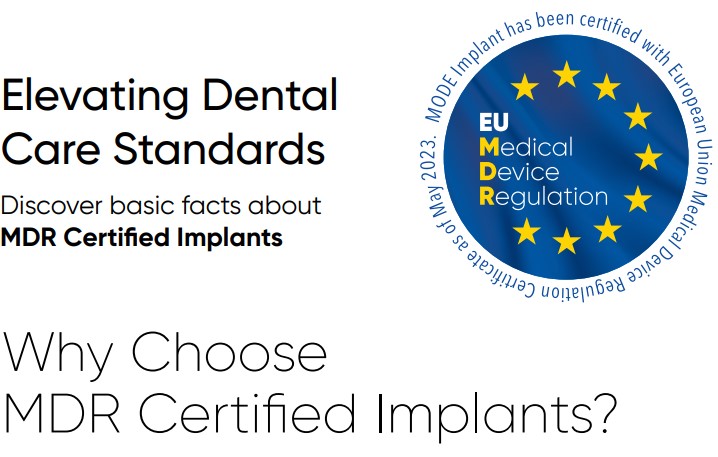EU-MDR Certification


The Medical Device Regulation (MDR) represents a set of rigorous European standards aimed at ensuring the safety and quality of medical devices. When a dental implant is MDR certified, it indicates that the product has passed extensive testing and quality control measures. This process involves evaluating the biocompatibility of materials, ensuring the manufacturing process is sterile and safe, and confirming that the implant performs reliably under various conditions. By choosing an MDR certified implant, patients and practitioners are assured that the product adheres to the latest and most stringent safety regulations, significantly reducing the risk of complications and ensuring long-term health benefits.
Healthcare providers must ensure they are using MDR-certified implants, which aligns with their commitment to patient safety and quality care. Using certified implants means they are utilizing products that are at the forefront of medical innovation and safety, reducing the risk of complications and ensuring the best outcomes for patients.

Commitment to Excellence: MDR certification is not just a compliance marker; it’s a commitment to ongoing improvement and excellence. It requires manufacturers to engage in continuous monitoring and upgrading of their products. This might involve investing in research and development, adopting innovative manufacturing technologies, and staying ahead of industry trends. As a result, MDR certified implants are often at the forefront of dental technology, incorporating advanced features that improve their performance, durability, and patient comfort.
Manufacturers of dental implants are required to conduct extensive risk analysis and clinical evaluations, maintain a high standard of product safety and performance, and ensure traceability throughout the implant’s lifecycle. They must implement and maintain a quality management system, undergo regular audits, and continuously monitor product safety and performance through post-market surveillance. This commitment requires significant investment in research, development, and quality control to ensure every product meets these high standards.

Prioritizing Well-being: A patient-centric approach means that every step of the implant’s design, development, and distribution is considered from the patient’s perspective. This includes ensuring that implants are not just effective, but also comfortable and suited to diverse needs. It means looking beyond the technical specifications to consider the patient’s overall experience, from the surgical procedure to recovery and long-term use.
Reliability and Effectiveness: Through MDR certification, patients are assured that the implants have been tested for reliability under a variety of conditions and over extended periods. They have proven effective in providing the desired outcomes, such as stable integration with bone, compatibility with body tissues, and resistance to wear and tear. Continuous post-market surveillance as part of MDR compliance ensures that any potential issues are identified and addressed swiftly, contributing to the overall reliability and effectiveness of the product.
Patients can be assured that an MDR certified dental implant has been subject to the most
rigorous testing and regulatory oversight. This means they are choosing a product recognized for
its safety, reliability, and quality. It reassures them that the medical devices used in their treatments
are regularly scrutinized and updated to reflect the latest in medical research and innovation.
What is MDR Certification?
The Medical Device Regulation (MDR) is a stringent European standard ensuring the safety and quality of medical devices. Achieving MDR certification means our dental implants have undergone rigorous testing and comply with the highest safety standards.
